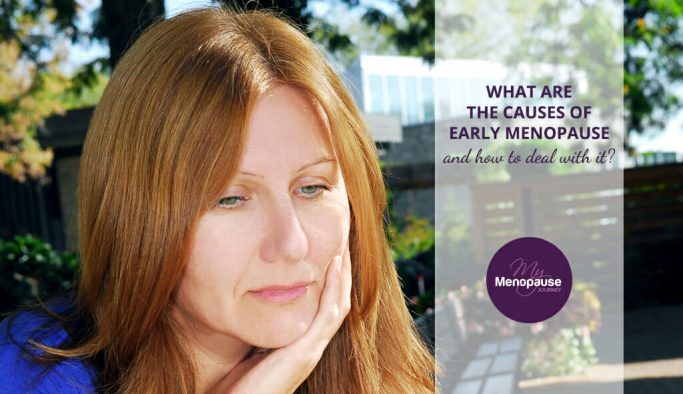Our brain is a wonderful yet very complex machine. Sometimes it can be our best friend, making us feel the best version of ourselves. But on other days, it plays tricks on us, messing up our own memory and thinking.
Is brain fog really real?
Imagine having a meeting with an important person, and in the middle of your conversation, you couldn’t remember his/her name. How about going to the supermarket and forgetting why you’re there? Sometimes we check our phones, a notification distracts us, and we forget why we pulled it out in the first place. Yes, it can be pretty embarrassing and frustrating.
If you’ve ever been in those situations, you’re not alone. Brain fog is an annoying situation many women experience as soon as they enter menopause. We feel like we can’t think clearly, and our memory is not as good as it was when we were younger. If you think you’re having memory issues, don’t be frightened: You’re most probably not getting dementia, nor Alzheimer’s. It’s just good old menopause!


Table of Contents
So, sit down, relax and let’s talk about the shame monster that is brain fog—why it happens during midlife and how you can banish it, the natural way!
What is Brain Fog?
Sixty percent of women in menopause experience lapses in memory from time to time. So, if you forget where you placed your cellphone or couldn’t remember an important date, don’t freak out. It is all part of the ride!
Memory loss and cognitive decline is a frequent complaint during the menopause transition and among postmenopausal women. The most common science behind this is that changes in memory correspond with diminished estrogen production – which is a prominent symptom in menopause!
Interestingly, a study conducted in 2014 has provided a conceptual framework to bridge the gap between the frequency of memory complaints in post-menopausal women and the development of a more holistic treatment approach.
With peri- and post-menopausal women reporting memory problems, the study’s results state that it is likely that cognitive deficits are not solely caused by declines in estrogen production! They are also likely to stem from reductions in sleep quality, increased depression levels, and the onset of hot flashes.
Seeing the pattern yet? They are all checking the symptom boxes for menopause! Undoubtedly, this study highly supports the relevant relationship between the cause-effect situation for memory loss and menopause. The same study also had the scope to report a potential treatment in addressing symptoms of cognitive decline during menopause; it suggests that “mind-body approach”, meaning holistic interventions, may hold promise for treating cognitive declines associated with the menopausal transition.
What is it like to have a fuzzy mind?
- You find it hard to understand and retain information
- You feel confused or disorganized
- You feel exhausted
- You have trouble focusing or putting your thoughts into words
- You become forgetful. You struggle remembering things, like dates or names
- You experience short-term memory problems (I.e. forgetting what was said during conversations)
- You lack energy, thus completing tasks takes longer than usual
The good news for women is brain fog in menopause doesn’t last forever. One research in 2019 showed that women recovered their memory skills and learning abilities in post-menopause.
Why am I suffering from brain fog and how do I fight back?
There are different reasons why you’re experiencing fuzzy thinking. Luckily, there are also many ways you can take to reduce fogginess!
Reason #1: Imbalanced Hormones
Our hormones, especially estrogen, fluctuate when we enter menopause. As a result, neurotransmitters in our brain, like serotonin, get out of balance. This does not only affect our mood; a bunch of symptoms also arise – and brain fog is one of them.
Research shows that areas of the brain responsible for memory and thinking are estrogen sensitive. The next time you walk inside a room and forget why you’re there, the culprit might just be your low estrogen levels.
A study proved how women who had low estradiol – a form of estrogen – performed poorly on the memory tests given to them.
Another study suggests that women whose ovaries have been removed report problems with memory and thinking. Estrogens are produced primarily by the ovaries, so taking these organs can dramatically decrease the body’s estrogen supply.
How to Balance Your Hormones
Eat phytoestrogen-rich foods. You can get started by consuming foods high in phytoestrogens – these are compounds found in plants that act like estrogen when ingested in the body. Foods loaded with phytoestrogens include flaxseed, broccoli, cauliflower, beans and peas.
Increase the friendly bacteria in your gut. Bacterial imbalance in the gut can interfere with the distribution of estrogen from the digestive tract. To promote healthy digestion, we need to include probiotics in our diet. Best sources of probiotics include pickled vegetables, sauerkraut, tempeh, kimchi, natto and miso.
Fill your body with vitamins and nutrients. Our body needs sufficient amounts of zinc, magnesium and vitamin B6 to support the breakdown and distribution of estrogen. Dr. Mindy Pelz, a recognized advocate of the alternative health world and an expert in brain function, claims that a simple nutrient like magnesium can improve brain fog and other discomforts we encounter in middle age.
Consider BHRT. Bioidentical Hormone Replacement Therapy (BHRT) is a form of treatment where hormones from plant-based sources, such as yam and soy, are used to create replacement hormones for the ones in our body. These plants have a similar molecular structure to hormones we naturally produce, making them safer than synthetic hormones. Many women undergo BHRT to balance their hormones and improve their quality of life during menopause.
Since hormone replacement therapy can increase our estrogen levels, it may improve our brain function and reduce the risk of Alzheimer’s disease, osteoporosis and dementia. However, you should know that there are still many ongoing researches to prove the positive effects of HRT and BHRT on the brain’s functionality.
Understand HRT and BHRT better and know about their benefits and risks.
Reason #2: Poor Diet
Diet also has a part to play in brain fog. Our gut serves as our second brain and eating the wrong kind of food definitely affects how our brain works. (I’ll share later what the best foods for the brain are.)
For example, eating foods that we are allergic and sensitive to can cause fogginess. Some common foods that may cause allergies and sensitivities include MSG, peanuts, alcohol, aspartame, refined carbohydrates, caffeine and dairy.
Dehydration can also contribute to sluggish thinking. This is because two-thirds of our brain is made up of water.
How to Improve Your Diet
Watch what you eat. At this stage in life, our body gets more sensitive to what we eat. Stay away from sugary foods, gluten and dairy. Eating foods rich in vitamin B12 is vital to our health, especially as we age, as it can promote healthy brain function.
Get plenty of essential fatty acids. Sixty percent of the brain is made up of DHA, a type of omega-3 fatty acid. This makes DHA the most preferred nutrient for the brain. DHA-rich food sources include fish, shellfish and algae.
Consume more brain foods. There are countless foods linked to brain power but these ones rank among the best:
- Salmon
- Blueberries
- Spinach
- Turmeric
- Avocado
- Broccoli
- Walnuts
- Eggs
- Dark chocolate
Rehydrate the brain. When your brain feels like it’s walking through a fog, it could be your brain asking for water. Filling the body with 8-10 glasses of water every day is the best way to keep the brain well-hydrated.
The Keto-Green diet is the way to go. This diet increases the levels of ketones in the blood. Ketones are molecules that can replace glucose as an energy source for the brain. Studies show that a Keto lifestyle improves blood flow in the brain, hence improving brain function.
The Keto-Green menu consists of plenty of leafy greens and other low-calorie veggies, like broccoli, cauliflower and cabbage. It also favors free-range and wild-caught protein sources, such as eggs, meat, poultry and fatty fish, like salmon. This diet also encourages the use of essential fats, which you can get from avocado, nuts, and olive oil.
Combined with intermittent fasting, Keto will make a huge difference not only in brain fog but for many other menopausal symptoms.
Reason #3: Stressful Life
A stressed brain diminishes our ability to think clearly and to focus. We also experience memory loss due to stress. Too much cortisol (a stress hormone) in our blood can harm our brain cells. This hormone can also damage our hippocampus, an essential part of the brain that helps in the formation and storage of memory.
How to free the mind from stress
Practice meditation and mindfulness. These are two of the best techniques to reduce stress. These practices relax the brain, improving your focus and concentration. They also help you sleep better at night. Yoga and other mind-body exercises, like Pilates and Tai Chi, provide similar benefits. You may also want to try different types of natural therapy such as acupuncture, aromatherapy and reflexology. We have more tips on how to deal with stress in our article here. Be sure to check it out.
Move more often: Exercise burns off cortisol and promotes new brain cell formation. It also helps you get better sleep. Go out and take a walk for 30-40 minutes every day. Joining a gym class and having a workout buddy can be very helpful too!
Extra Tips for Fighting Brain Fog Through Exercise
Listen to Dr. Northrup explaining brain fog and why there’s no need to worry. You’re not going crazy, and you can clear the fogginess in several ways – one of them is doing an aerobic exercise! In fact, her go-to exercise is dancing, which I happened to love as well!
Check out her video here [10:03]:
Keep your brain active. It is also important to keep our brain healthy and as fit as our body. You can do this by doing brain exercises, like solving puzzles and mind-boggling games. You can also challenge your brain by developing a new skill, such as learning a new language or playing a new sport. It’s never too late to learn something new!
But that’s not all, Dr. Northrup has one surprising tip to keep your brain sharp as you age. Find about it here [4:13]:
Surround yourself with the right people. Menopause itself is stressful enough for you to have to deal with toxic people. After all, you’ll need all the support and understanding you can get from those around you. It’s better to keep your circle small, positive and warm.
Reason #4: Sleepless Nights
Night sweats and hot flashes disrupt our good night’s sleep. As a result, we wake up the next day feeling exhausted. We also feel foggy and slower than normal. Completing tasks becomes challenging too. That’s because when we lack sleep, we deprive our brain of the time to clean up after itself after a long day of work. On the other hand, sleeping re-energizes our brain cells, flushes out waste from the brain and improves learning and memory.
How to get enough sleep?
Have a schedule: To combat the sleep issues that come with menopause, try to stick to a sleeping and waking schedule. Make sure to sleep at least 7 hours per night. If you don’t have a steady sleeping pattern, now is the perfect time to develop one!
Relieve night sweats: If you’re constantly having night sweats, wear lightweight clothes and keep your room as cool as you can. Consider alternative therapies like massages to relax your muscles and calm your nerves. It also helps to keep an overall positive mindset. Happy hormones, such as serotonin, endorphin and epinephrine calm the body and can relieve night sweats. Discover more solutions on getting a good night’ sleep in this article.
Reason #5: Medications and Medical Conditions
Brain fog is a common side effect of many drugs. These include meds for antihistamines, blood pressure lowering meds, anti-anxiety meds, some sleep and pain meds and meds for urinary incontinence.
Brain fog is also part of many medical conditions, like diabetes, depression, lupus, multiple sclerosis and chronic fatigue syndrome.
There are alternative treatments for most conditions, but never exchange any prescriptions without consulting a doctor that know your condition.
Menopause brain fog is not a permanent condition but living with it can be frustrating. Fortunately, there are many natural ways you can fight it off until things go back to normal. That includes keeping your hormones balanced, maintaining a healthy diet and lifestyle and reducing stress. Adding a lot of brain-boosting foods mentioned above in your diet will also do wonders for your mind.
Have you had brain fog? Share your most embarrassing brain fog moments in the comments below!
Shine a light on your friends’ wall! Get this article up on your Facebook, Twitter, Pinterest and Instagram. Use the share buttons!
Sources:
drannacabeca.com/blogs/brain-fog/5-natural-ways-to-overcome-menopause-brain-fog
draxe.com/brain-fog/
healthline.com/health/menopause/menopause-brain-fog#takeaway
healthline.com/health/menopause/menopause-brain-fog#research
healthline.com/health/menopause/memory-alzheimers#6
healthline.com/health/brain-fog#causes
healthline.com/health/brain-fog#treatment
urmc.rochester.edu/news/story/3436/brain-fog-of-menopause-confirmed.aspx
health.harvard.edu/blog/nutritional-psychiatry-your-brain-on-food-201511168626
bebrainfit.com/brain-fog-causes-treatment/
👉 What to Do Next
Don’t go just yet — especially if you’ve been feeling off and no one’s given you real answers.
Go to the START HERE page.
It’s where things begin to feel clearer. No more second-guessing, no more sorting through conflicting advice. Just calm, honest support for where you are right now.
And if you haven’t yet, download the FREE GUIDE.
It’s quick, clear, and made to help you feel better — without having to turn your whole life upside down.


Gita is the founder of My Menopause Journey. Since 2014, she has been supporting midlife women by sharing hard-earned learnings from her own experience. To advance her knowledge, Gita puts a lot of her time and effort into understanding the broad spectrum of women’s health. She immerses in extensive research about the physical, mental and emotional aspects of menopause. Gita believes in the life-changing power of healthy, holistic living — this is where she anchors her message to all women. Learn more about her marvelous mission in About us - My Menopause Journey.





